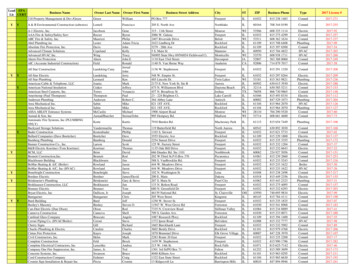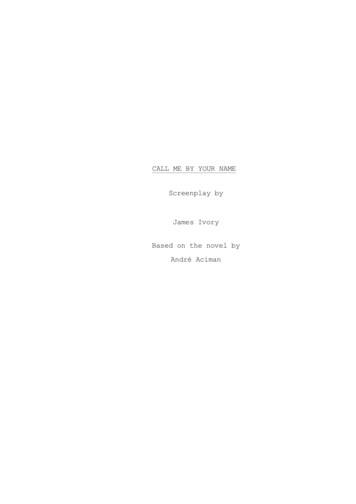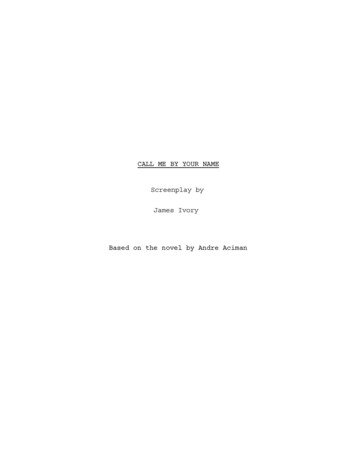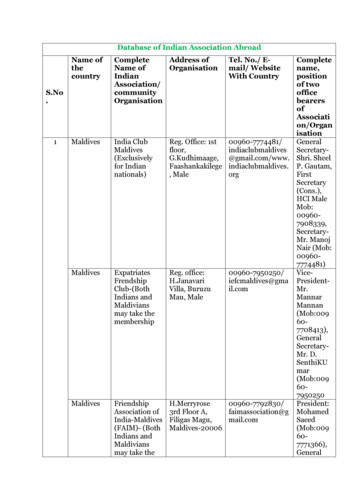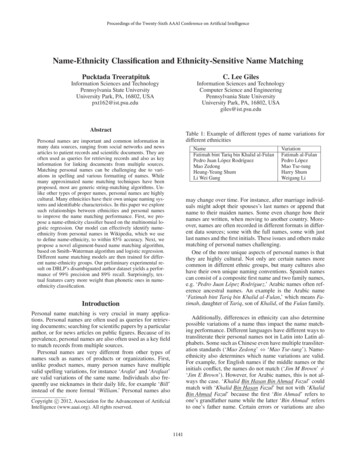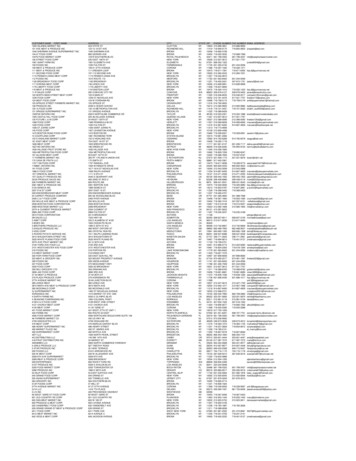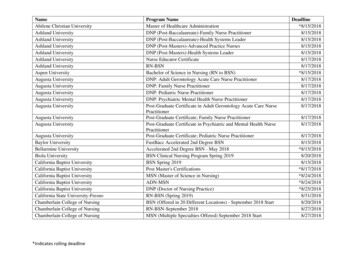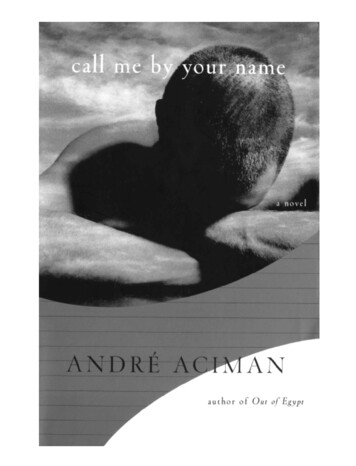
Transcription
Call Me by Your NameAndré AcimanFor Albio,Alma de mi vida
PART 1If Not Later, When?"Later!" The word, the voice, the attitude.I'd never heard anyone use "later" to saygoodbye before. It sounded harsh, curt, anddismissive, spoken with the veiled indifference of people who may not care to seeor hear from you again.It is the first thing I remember about him,and I can hear it still today. Later!I shut my eyes, say the word, and I'm backin Italy, so many years ago, walking down the
tree-lined driveway, watching him step out ofthe cab, billowy blue shirt, wide-open collar,sunglasses, straw hat, skin everywhere.Suddenly he's shaking my hand, handing mehis backpack, removing his suitcase from thetrunk of the cab, asking if my father is home.It might have started right there and then:the shirt, the rolled-up sleeves, the roundedballs of his heels slipping in and out of hisfrayed espadrilles, eager to test the hot gravelpath that led to our house, every stride alreadyasking, Which way to the beach?This summer's houseguest. Another bore.Then, almost without thinking, and withhis back already turned to the car, he wavesthe back of his free hand and utters a carelessLater! to another passenger in the car who hasprobably split the fare from the station. Noname added, no jest to smooth out the ruffledleave-taking, nothing. His one-word send-off:
brisk, bold, and blunted — take your pick, hecouldn't be bothered which.You watch, I thought, this is how he'll saygoodbye to us when the time comes. With agruff, slapdash Later!Meanwhile, we'd have to put up with himfor six long weeks.I was thoroughly intimidated. Theunapproachable sort.I could grow to like him, though. Fromrounded chin to rounded heel. Then, withindays, I would learn to hate him.This, the very person whose photo on theapplication form months earlier had leapt outwith promises of instant affinities.Taking in summer guests was my parents' wayof helping young academics revise amanuscript before publication. For six weekseach summer I'd have to vacate my bedroom
and move one room down the corridor into amuch smaller room that had once belonged tomy grandfather. During the winter months,when we were away in the city, it became apart-time toolshed, storage room, and atticwhere rumor had it my grandfather, mynamesake, still ground his teeth in his eternalsleep. Summer residents didn't have to payanything, were given the full run of the house,and could basically do anything they pleased,provided they spent an hour or so a dayhelping my father with his correspondenceand assorted paperwork. They became part ofthe family, and after about fifteen years ofdoing this, we had gotten used to a shower ofpostcards and gift packages not only aroundChristmastime but all year long from peoplewho were now totally devoted to our familyand would go out of their way when theywere in Europe to drop by B. for a day or two
with their family and take a nostalgic tour oftheir old digs.At meals there were frequently two orthree other guests, sometimes neighbors orrelatives, sometimes colleagues, lawyers,doctors, the rich and famous who'd drop by tosee my father on their way to their ownsummer houses. Sometimes we'd even openour dining room to the occasional touristcouple who'd heard of the old villa and simplywanted to come by and take a peek and weretotally enchanted when asked to eat with usand tell us all about themselves, whileMafalda, informed at the last minute, dishedout her usual fare. My father, who wasreserved and shy in private, loved nothingbetter than to have some precocious risingexpert in a field keep the conversation going ina few languages while the hot summer sun,
after a few glasses of rosatello, ushered in theunavoidable afternoon torpor. We named thetask dinner drudgery—-and, after a while, sodid most of our six-week guests.Maybe it started soon after his arrival duringone of those grinding lunches when he sat nextto me and it finally dawned on me that, despitea light tan acquired during his brief stay inSicily earlier that summer, the color on thepalms of his hands was the same as the pale,soft skin of his soles, of his throat, of the bottom of his forearms, which hadn't really beenexposed to much sun. Almost a light pink, asglistening and smooth as the underside of alizard's belly. Private, chaste, unfledged, like ablush on an athlete's face or an instance ofdawn on a stormy night. It told me thingsabout him I never knew to ask.
It may have started during those endless hoursafter lunch when everybody lounged about inbathing suits inside and outside the house,bodies sprawled everywhere, killing time beforesomeone finally suggested we head down to therocks for a swim. Relatives, cousins, neighbors,friends, friends of friends, colleagues, or justabout anyone who cared to knock at our gateand ask if they could use our tenniscourt—everyone was welcome to lounge andswim and eat and, if they stayed long enough,use the guesthouse.Or perhaps it started on the beach. Or at thetennis court. Or during our first walk togetheron his very first day when I was asked to showhim the house and its surrounding area and,one thing leading to the other, managed to takehim past the very old forged-iron metal gate as
far back as the endless empty lot in thehinterland toward the abandoned train tracksthat used to connect B. to N. "Is there anabandoned station house somewhere?" heasked, looking through the trees under thescalding sun, probably trying to ask the rightquestion of the owner's son. "No, there wasnever a station house. The train simplystopped when you asked." He was curiousabout the train; the rails seemed so narrow. Itwas a two-wagon train bearing the royalinsignia, I explained. Gypsies lived in it now.They'd been living there ever since my motherused to summer here as a girl. The gypsies hadhauled the two derailed cars farther inland.Did he want to see them? "Later. Maybe."Polite indifference, as if he'd spotted mymisplaced zeal to play up to him and wassummarily pushing me away.But it stung me.
Instead, he said he wanted to open anaccount in one of the banks in B., then pay avisit to his Italian translator, whom his Italianpublisher had engaged for his book.I decided to take him there by bike.The conversation was no better on wheelsthan on foot. Along the way, we stopped forsomething to drink. The bar-tabaccheria wastotally dark and empty. The owner wasmopping the floor with a powerful ammoniasolution. We stepped outside as soon as wecould. A lonely blackbird, sitting in aMediterranean pine, sang a few notes thatwere immediately drowned out by the rattle ofthe cicadas.I took a long swill from a large bottle ofmineral water, passed it to him, then drankfrom it again. I spilled some on my hand andrubbed my face with it, running my wet fingers
through my hair. The water was insufficientlycold, not fizzy enough, leaving behind anunslaked likeness of thirst.What did one do around here?Nothing. Wait for summer to end.What did one do in the winter, then?I smiled at the answer I was about to give.He got the gist and said, "Don't tell me: waitfor summer to come, right?"I liked having my mind read. He'd pickup on dinner drudgery sooner than thosebefore him."Actually, in the winter the place gets verygray and dark. We come for Christmas.Otherwise it's a ghost town.""And what else do you do here atChristmas besides roast chestnuts and drinkeggnog?"He was teasing. I offered the same smile asbefore. He understood, said nothing, we
laughed.He asked what I did. I played tennis.Swam. Went out at night. Jogged. Transcribedmusic. Read.He said he jogged too. Early in themorning. Where did one jog around here?Along the promenade, mostly. I could show himif he wanted.It hit me in the face just when I wasstarting to like him again: "Later, maybe."I had put reading last on my list, thinking that,with the willful, brazen attitude he'd displayedso far, reading would figure last on his. A fewhours later, when I remembered that he hadjust finished writing a book on Heraclitusand that "reading" was probably not aninsignificant part of his life, I realized that Ineeded to perform some clever backpedalingand let him know that my real interests lay
right alongside his. What unsettled me, though,was not the fancy footwork needed to redeemmyself. It was the unwelcome misgivings withwhich it finally dawned on me, both then andduring our casual conversation by the traintracks, that I had all along, without seemingto, without even admitting it, already beentrying—and failing—to win him over. When Idid offer—because all visitors loved theidea—to take him to San Giacomo and walkup to the very top of the belfry we nicknamedTo-die-for, I should have known better than tojust stand there without a comeback. I thoughtI'd bring him around simply by taking him upthere and letting him take in the view of thetown, the sea, eternity. But no. Later!But it might have started way later than Ithink without my noticing anything at all. You
see someone, but you don't really see him, he'sin the wings. Or you notice him, but nothingclicks, nothing "catches," and before you'reeven aware of a presence, or of somethingtroubling you, the six weeks that were offeredyou have almost passed and he's either alreadygone or just about to leave, and you'rebasically scrambling to come to terms withsomething, which, unbeknownst to you, hasbeen brewing for weeks under your very noseand bears all the symptoms of what you'reforced to call I want. How couldn't I haveknown, you ask? I know desire when I seeit—and yet, this time, it slipped by completely.I was going for the devious smile that wouldsuddenly light up his face each time he'd readmy mind, when all I really wanted was skin,just skin.At dinner on his third evening, I sensed thathe was staring at me as I was explaining
Haydn's Seven Last Words of Christ, which I'dbeen transcribing. I was seventeen that year and,being the youngest at the table and the leastlikely to be listened to, I had developed thehabit of smuggling as much information intothe fewest possible words. I spoke fast, whichgave people the impression that I was alwaysflustered and muffling my words. After I hadfinished explaining my transcription, I becameaware of the keenest glance coming from myleft. It thrilled and flattered me; he wasobviously interested—he liked me. It hadn'tbeen as difficult as all that, then. But when, aftertaking my time, I finally turned to face him andtake in his glance, I met a cold and icyglare—something at once hostile and vitrifiedthat bordered on cruelty.It undid me completely. What had I doneto deserve this? I wanted him to be kind to meagain, to laugh with me as he had done just a
few days earlier on the abandoned train tracks,or when I'd explained to him that sameafternoon that B. was the only town in Italywhere the corriera, the regional bus line, carrying Christ, whisked by without ever stopping.He had immediately laughed and recognizedthe veiled allusion to Carlo Levi's book. I likedhow our minds seemed to travel in parallel,how we instantly inferred what words theother was toying with but at the last momentheld back.He was going to be a difficult neighbor.Better stay away from him, I thought. Tothink that I had almost fallen for the skin ofhis hands, his chest, his feet that had nevertouched a rough surface in theirexistence—and his eyes, which, when theirother, kinder gaze fell on you, came like themiracle of the Resurrection. You could neverstare long enough but needed to keep staring to
find out why you couldn't.I must have shot him a similarly wickedglance.For two days our conversations came to asudden halt.On the long balcony that both ourbedrooms shared, total avoidance: just amakeshift hello, good morning, nice weather,shallow chitchat.Then, without explanation, thingsresumed.Did I want to go jogging this morning? No,not really. Well, let's swim, then.Today, the pain, the stoking, the thrill ofsomeone new, the promise of so much blisshovering a fingertip away, the fumbling aroundpeople I might misread and don't want to loseand must second-guess at every turn, thedesperate cunning I bring to everyone I wantand crave to be wanted by, the screens I put up
as though between me and the world therewere not just one but layers of rice-papersliding doors, the urge to scramble and unscramble what was never really coded in thefirst place — all these started the summerOliver came into our house. They are embossed on every song that was a hit that summer,in every novel I read during and after his stay,on anything from the smell of rosemary on hotdays to the frantic rattle of the cicadas in theafternoon — smells and sounds I'd grown upwith and known every year of my life untilthen but that had suddenly turned on me andacquired an inflection forever colored by theevents of that summer.Or perhaps it started after his first week,when I was thrilled to see he still rememberedwho I was, that he didn't ignore me, and that,therefore, I could allow myself the luxury ofpassing him on my way to the garden and not
having to pretend I was unaware of him. Wejogged early on the first morning—all the wayup to B. and back. Early the next morning weswam. Then, the day after, we jogged again. Iliked racing by the milk delivery van when itwas far from done with its rounds, or by thegrocer and the baker as they were just gettingready for business, liked to run along the shoreand the promenade when there wasn't a soulabout yet and our house seemed a distantmirage. I liked it when our feet were aligned,left with left, and struck the ground at the sametime, leaving footprints on the shore that Iwished to return to and, in secret, place myfoot where his had left its mark.This alternation of running and swimmingwas simply his "routine" in graduate school.Did he run on the Sabbath? I joked. Healways exercised, even when he was sick; he'dexercise in bed if he had to. Even when he'd
slept with someone new the night before, hesaid, he'd still head out for a jog early in themorning. The only time he didn't exercise waswhen they operated on him. When I askedhim what for, the answer I had promisednever to incite in him came at me like thethwack of a jack-in-the-box wearing a balefulsmirk. "Later."Perhaps he was out of breath and didn'twant to talk too much or just wanted toconcentrate on his swimming or his running.Or perhaps it was his way of spurring me todo the same— totally harmless.But there was something at once chillingand off-putting in the sudden distance thatcrept between us in the most unexpectedmoments. It was almost as though he weredoing it on purpose; feeding me slack, andmore slack, and then yanking away anysemblance of fellowship.
The steely gaze always returned. One day,while I was practicing my guitar at what hadbecome "my table" in the back garden by thepool and he was lying nearby on the grass, Irecognized the gaze right away. He had beenstaring at me while I was focusing on thefingerboard, and when I suddenly raised myface to see if he liked what 1 was playing,there it was: cutting, cruel, like a glisteningblade instantly retracted the moment its victimcaught sight of it. He gave me a bland smile, asthough to say, No point hiding it now.Stay away from him.He must have noticed I was shaken and inan effort to make it up to me began asking mequestions about the guitar. I was too much onmy guard to answer him with candor.Meanwhile, hearing me scramble for answersmade him suspect that perhaps more wasamiss than I was showing. "Don't bother
explaining. Just play it again." But I thoughtyou hated it. Hated it? Whatever gave you thatidea? We argued back and forth. "Just play it,will you?" "The same one?" "The same one."I stood up and walked into the living room,leaving the large French windows open so thathe might hear me play it on the piano. Hefollowed me halfway and, leaning on thewindows' wooden frame, listened for a while."You changed it. It's not the same. Whatdid you do to it?""I just played it the way Liszt would haveplayed it had he jimmied around with it.""Just play it again, please!"I liked the way he feigned exasperation. SoI started playing the piece again.After a while: "I can't believe you changedit again.""Well, not by much. This is just howBusoni would have played it if he had altered
Liszt's version.""Can't you just play the Bach the wayBach wrote it?""But Bach never wrote it for guitar. Hemay not even have written it for theharpsichord. In fact, we're not even sure it's byBach at all.""Forget I asked.""Okay, okay. No need to get so worked up," Isaid. It was my turn to feign grudgingacquiescence. "This is the Bach as transcribedby me without Busoni and Liszt. It's a veryyoung Bach and it's dedicated to his brother."I knew exactly what phrase in the piecemust have stirred him the first time, and eachtime I played it, I was sending it to him as alittle gift, because it was really dedicated tohim, as a token of something very beautiful inme that would take no genius to figure out and
that urged me to throw in an extended cadenza.Just for him.We were—and he must have recognized thesigns long before I did—flirting.Later that evening in my diary, I wrote: I wasexaggerating when 1 said I thought you hatedthe piece. What I meant to say was: I thoughtyou hated me. 1 was hoping you'd persuade meof the opposite—and you did, for a while.Why won't 1 believe it tomorrow morning?So this is who he also is, I said to myselfafter seeing how he'd flipped from ice tosunshine.I might as well have asked: Do I flip backand forth in just the same way?P.S. We are not written for one instrumentalone; I am not, neither are you.
I had been perfectly willing to brand him asdifficult and unapproachable and have nothingmore to do with him. Two words from him,and I had seen my pouting apathy change intoI'll play anything for you till you ask me to stop,till it's time for lunch, till the skin on my fingerswears off layer after layer, because I like doingthings for you, will do anything for you, justsay the word, I liked you from day one, andeven when you'll return ice for my renewedoffers of friendship, I'll never forget that thisconversation occurred between us and thatthere are easy ways to bring back summer inthe snowstorm.What I forgot to earmark in that promisewas that ice and apathy have ways of instantlyrepealing all truces and resolutions signed insunnier moments.Then came that July Sunday afternoon whenour house suddenly emptied, and we were the
only ones there, and fire tore through myguts—because "fire" was the first and easiestword that came to me later that same eveningwhen I tried to make sense of it in my diary. I'dwaited and waited in my room pinioned to mybed in a trancelike state of terror andanticipation. Not a fire of passion, not aravaging fire, but something paralyzing, likethe fire of cluster bombs that suck up theoxygen around them and leave you pantingbecause you've been kicked in the gut and avacuum has ripped up every living lung tissueand dried your mouth, and you hope nobodyspeaks, because you can't talk, and you prayno one asks you to move, because your heart isclogged and beats so fast it would sooner spitout shards of glass than let anything else flowthrough its narrowed chambers. Fire like fear,like panic, like one more minute of this and I'lldie if he doesn't knock at my door, but I'd
sooner he never knock than knock now. I hadlearned to leave my French windows ajar, andI'd lie on my bed wearing only my bathing suit,my entire body on fire. Fire like a pleading thatsays, Please, please, tell me I'm wrong, tell meI've imagined all this, because it can't possiblybe true for you as well, and if it's true for youtoo, then you're the crudest man alive. This, theafternoon he did finally walk into my roomwithout knocking as if summoned by myprayers and asked how come I wasn't with theothers at the beach, and all I could think ofsaying, though I couldn't bring myself to say it,was, To be with you. To be with you, Oliver.With or without my bathing suit. To be withyou on my bed. In your bed. Which is my bedduring the other months of the year. Do withme what you want. Take me. Just ask if I wantto and see the answer you'll get, just don't letme say no.
And tell me I wasn't dreaming that nightwhen I heard a noise outside the landing bymy door and suddenly knew that someone wasin my room, someone was sitting at the foot ofmy bed, thinking, thinking, thinking, andfinally started moving up toward me and wasnow lying, not next to me, but on top of me,while I lay on my tummy, and that I liked it somuch that, rather than risk doing anything toshow I'd been awakened or to let him changehis mind and go away, I feigned to be fastasleep, thinking, This is not, cannot, hadbetter not be a dream, because the words thatcame to me, as I pressed my eyes shut, were,This is like coming home, like coming homeafter years away among Trojans andLestrygonians, like coming home to a placewhere everyone is like you, where peopleknow, they just know— coming home aswhen everything falls into place and you sud-
denly realize that for seventeen years all you'dbeen doing was fiddling with the wrongcombination. Which was when I decided toconvey without budging, without moving asingle muscle in my body, that I'd be willing toyield if you pushed, that I'd already yielded,was yours, all yours, except that you weresuddenly gone and though it seemed too trueto be a dream, yet I was convinced that all Iwanted from that day onward was for you to dothe exact same thing you'd done in my sleep.The next day we were playing doubles, andduring a break, as we Were drinking Mafalda'slemonades, he put his free arm around me andthen gently squeezed his thumb and forefingersinto my shoulder in imitation of a friendlyVerhug-massage—thewholethingy
chummy-chummy. But I was so spellbound thatI wrenched myself free from his touch, becausea moment longer and I would have slackenedlike one of those tiny wooden toys whosegimp-legged body collapses as soon as themainsprings are touched. Taken aback, heapologized and asked if he had pressed a"nerve or something"—he hadn't meant tohurt me. He must have felt thoroughlymortified if he suspected he had either hurt meor touched me the wrong way. The last thing Iwanted was to discourage him. Still, I blurtedsomething like, "It didn't hurt," and would havedropped the matter there. But I sensed that if itwasn't pain that had prompted such a reaction,what other explanation could account for myshrugging him off so brusquely in front of myfriends? So I mimicked the face of someonetrying very hard, but failing, to smother agrimace of pain.
It never occurred to me that what hadtotally panicked me when he touched me wasexactly what startles virgins on being touchedfor the first time by the person they desire: hestirs nerves in them they never knew existedand that produce far, far more disturbingpleasures than they are used to on their own.He still seemed surprised by my reactionbut gave every sign of believing in, as I ofconcealing, the pain around my shoulder. Itwas his way of letting me off the hook and ofpretending he wasn't in the least bit aware ofany nuance in my reaction. Knowing, as Ilater came to learn, how thoroughly trenchantwas his ability to sort contradictory signals, Ihave no doubt that he must have alreadysuspected something. "Here, let me make itbetter." He was testing me and proceeded tomassage my shoulder. "Relax," he said in frontof the others. "But I am relaxing." "You're as
stiff as this bench. Feel this," he said toMarzia, one of the girls closest to us. "It's allknots." I felt her hands on my back. "Here,"he ordered, pressing her flattened palm hardagainst my back. "Feel it? He should relaxmore," he said. "You should relax more," sherepeated.Perhaps, in this, as with everything else,because I didn't know how to speak in code, Ididn't know how to speak at all. I felt like adeaf and dumb person who can't even use signlanguage. I stammered all manner of things soas not to speak my mind. That was the extentof my code. So long as I had breath to putwords in my mouth, I could more or less carryit off. Otherwise, the silence between uswould probably give me away— which waswhy anything, even the most splutterednonsense, was preferable to silence. Silencewould expose me. But what was certain to
expose me even more was my struggle toovercome it in front of others.The despair aimed at myself must havegiven my features something bordering onimpatience and unspoken rage. That he mighthave mistaken these as aimed at him nevercrossed my mind.Maybe it was for similar reasons that Iwould look away each time he looked at me:to conceal the strain on my timidity. That hemight have found my avoidance offensive andretaliated with a hostile glance from time totime never crossed my mind either.What I hoped he hadn't noticed in myoverreaction to his grip was something else.Before shirking off his arm, I knew I hadyielded to his hand and had almost leaned intoit, as if to say—as I'd heard adults so often saywhen someone happened to massage theirshoulders while passing behind them—Don't
stop. Had he noticed I was ready not just toyield but to mold into his body?This was the feeling I took to my diary thatnight as well: I called it the "swoon." Why hadI swooned? And could it happen soeasily—just let him touch me somewhere andI'd totally go limp and will-less? Was this whatpeople meant by butter melting?And why wouldn't I show him how like butter Iwas? Because was afraid of what mighthappen then? Or was I afraid he would havelaughed at me, told everyone, or ignored thewhole thing on the pretext I was too young toknow what I was doing? Or was it because ifhe so much as suspected—and anyone whosuspected would of necessity be on the samewavelength—he might be tempted to act on it?Did I want him to act? Or would I prefer alifetime of longing provided we both kept this
little Ping-Pong game going: not knowing,not-not knowing, not-not-not knowing? Justbe quiet, say nothing, and if you can't say"yes," don't say "no," say "later." Is this whypeople say "maybe" when they mean "yes," buthope you'll think it's "no" when all they reallymean is, Please, just ask me once more, andonce more after that?I look back to that summer and can'tbelieve that despite every one of my efforts tolive with the "fire" and the "swoon," life stillgranted wonderful moments. Italy. Summer.The noise of the cicadas in the early afternoon.My room. His room. Our balcony that shut thewhole world out. The soft wind trailing exhalations from our garden up the stairs to mybedroom. The summer I learned to love fishing.Because he did. To love jogging. Because hedid. To love octopus, Heraclitus, Tristan. Thesummer I'd hear a bird sing, smell a plant, or
feel the mist rise from under my feet on warmsunny days and, because my senses werealways on alert, would automatically findthem rushing to him.I could have denied so many things—thatI longed to touch his knees and wrists whenthey glistened in the sun with that viscous sheenI've seen in so very few; that I loved how hiswhite tennis shorts seemed perpetually stainedby the color of clay, which, as the weeks woreon, became the color of his skin; that his hair,turning blonder every day, caught the sunbefore the sun was completely out in themorning; that his billowy blue shirt, becomingever more billowy when he wore it on gustydays on the patio by the pool, promised toharbor a scent of skin and sweat that made mehard just thinking of it. All this I could have denied. And believed my denials.But it was the gold necklace and the Star
of David with a golden mezuzah on his neckthat told me here was something morecompelling than anything I wanted from him,for it bound us and reminded me that, whileeverything else conspired to make us the twomost dissimilar beings, this at leasttranscended all differences. I saw his staralmost immediately during his first day withus. And from that moment on I knew that whatmystified me and made me want to seek outhis friendship, without ever hoping to findways to dislike him, was larger than anythingeither of us could ever want from the other,larger and therefore better than his soul, mybody, or earth itself. Staring at his neck withits star and telltale amulet was like staring atsomething timeless, ancestral, immortal in me,in him, in both of us, begging to be rekindledand brought back from its millenary sleep.What baffled me was that he didn't seem
to care or notice that I wore one too. Just as heprobably didn't care or notice each time myeyes wandered along his bathing suit and triedto make out the contour of what made usbrothers in the desert.With the exception of my family, he wasprobably the only other Jew who had ever setfoot in B. But unlike us he let you see it fromthe very start. We were not conspicuous Jews.We wore our Judaism as people do almosteverywhere in the world: under the shirt, nothidden, but tucked away. "Jews ofdiscretion," to use my mother's words. To seesomeone proclaim his Judaism on his neck asOliver did when he grabbed one of our bikesand headed into town with his shirt wide openshocked us as much as it taught us we could dothe same and get away with it. I tried imitatinghim a few times. But I was too self-conscious,like someone trying to feel natural while
walking about naked in a locker r orn only toend up aroused by his own nakedness. In town,I tr'ed flaunting my Judaism with the silentbluster that comes less rotn arrogance thanfrom repressed shame. Not him. It's not thathe never thought about being Jewish orabout the life of Jews in a Catholic country.Sometimes we spoke about just this topicduring those long afternoons when both of uswould put aside work and enjoy chattingwhile the entire household a
Call Me by Your Name André Aciman For Albio, Alma de mi vida . PART 1 If Not Later, When? "Later!" The word, the voice, the attitude. I'd never heard anyone use "later" to say goodbye before. It sounded harsh, curt, and dismissive, spoken with the veiled in-File Size: 1MB
